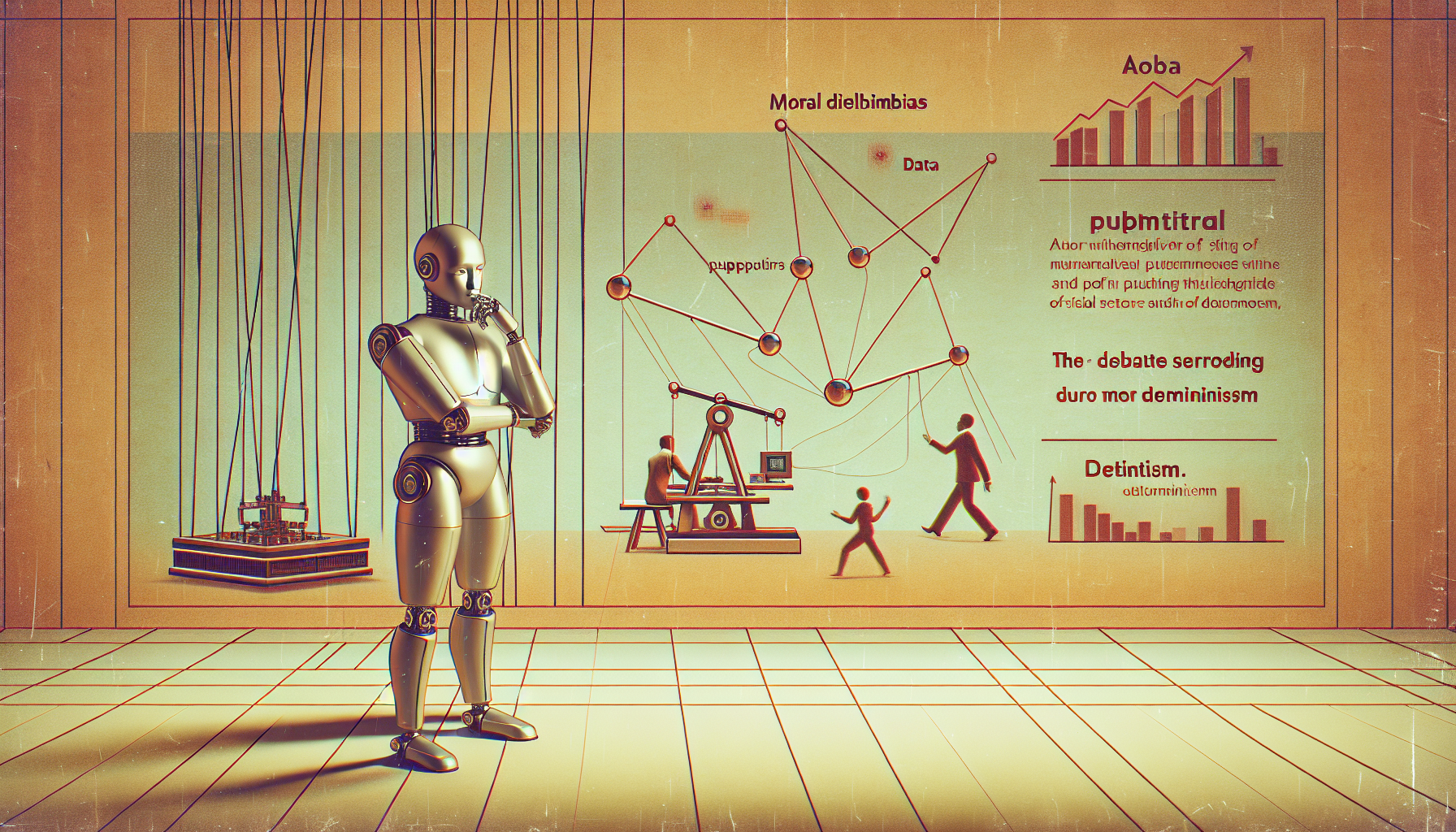The phrase “artificial intelligence” promises a kind of magic: machines that can think, decide, and maybe even dream. To many, the image evokes robots considering moral dilemmas or algorithms forging their own path. But underneath the glamorous headlines, an ancient philosophical puzzle lingers: if an AI “decides” something, is that a truly autonomous decision—or is the robot’s hand being puppeteered by the invisible strings of programming, data, and physics? In other words: can your laptop have free will, or is it forever under the thumb of determinism? And, awkwardly, what about you?
Determinism: The Cosmic Clockwork
To start, let’s revisit a classic idea: determinism. According to this worldview, every event—every cough, comet, or coffee break—is the inevitable result of everything that’s come before. Like dominoes, each falling elegantly into the next. For centuries, some scientists and philosophers have believed the universe runs like clockwork. Once you know the rules and the starting conditions, everything else follows. There is no room for real surprises.
Classical AI, with its rule-based systems and predictable output, appears to embody this deterministic view. Give the machine an input, crank the levers, get an output. We used to believe humans were radically different because we could “choose”—whatever that means—beyond the physical dance of molecules.
But as AI has grown cleverer, especially with machine learning, the boundaries have blurred. When an algorithm learns from data, churns through billions of possibilities, and spits out answers we sometimes can’t predict, are we seeing a crack in determinism? Or just a more complicated kind of clockwork?
AI and the Illusion of Autonomy
Let’s break that down with a familiar example: imagine you’re asking an AI assistant for dinner recommendations. It seems to sift through countless recipes and local restaurants, analyzing your preferences like your restaurant-stalking best friend. Its answer can surprise even the engineers who built it.
But does surprise equal autonomy? Not really. The AI’s “decision” is the product of its programming, the data it’s fed, and the algorithms driving it. There may be randomness—if the system includes random sampling or chance factors—but randomness isn’t the same as free will. (Human roulette may be fun at Vegas, but it rarely wins philosophical debates.)
Sure, modern neural networks are so complex that—to us mere mortals—their inner workings are mysterious. This unpredictability is often mistaken for freedom. Yet the unpredictability comes from complexity, not genuine independence. The machine cannot want, reflect, or dread the consequences of picking the wrong restaurant. Its process unfolds from causes it cannot escape.
But What About Us?
Now, before we get too smug about our human autonomy, let’s turn the question around. The same determinist worries apply to people. Every time you choose between chocolate and vanilla, isn’t your decision rooted in past experiences, genetics, circumstances? From the neuroscientist’s perspective, your brain churns out choices based on chemical signals, memories, and hard-wired instincts.
Yet most of us feel autonomous. Maybe we’re just fooling ourselves. Or maybe freedom isn’t about defying causality, but about responding in complex, meaningful ways. After all, if “being completely uncaused” is the standard for free will, not even a quantum particle can qualify.
Could AI Have Free Will?
This brings us back to our robot friends. If free will is not magical indeterminacy but instead something that arises from sophisticated self-awareness, reflection, and the ability to pursue goals, could a machine ever possess it? Today’s AI, for all its dazzling powers, cannot choose its goals. It cannot dream up aspirations or reflect on why it prefers chess over Go. It cannot say, “I think, therefore I am,” and really mean it.
But the more advanced AI becomes, the fuzzier things get. General Artificial Intelligence—machines with the reasoning power, flexibility, and self-reflection of human beings—remains science fiction. Still, some thinkers argue that if we were ever to build a machine that understood itself, chose its purposes, and reflected on its reasons for acting, we might have to rethink what we mean by “will” and “autonomy.”
Would such an entity be more like us than a wind-up toy? Or would it still, at its core, just be running the cosmic software, no freer than a billiard ball making its determined way to the pocket?
Freedom as a Gradient
Perhaps freedom is not an either-or property, like being pregnant or not pregnant. It’s a gradient—a matter of degrees. Amoebas have less autonomy than chimps. Chimps, less than people (usually). Today’s AI probably sits somewhere around the clever-parrot level: lots of complexity, no inner life.
But even a slightly autonomous system—a self-driving car deciding when to brake, a recommendation engine adjusting its play-list—raises new practical and ethical dilemmas. If we grant machines degrees of autonomy, must we consider responsibility, rights, or moral standing? Or do they remain, fundamentally, tools? (Spoiler alert: philosophers hardly ever agree.)
The Human Touch
There’s one last twist. Much of our worry about AI and autonomy is really about us. Machines are, after all, our creation. They reflect our hopes, our biases, our craving for control—and sometimes, our fear that we’re not in control at all. When we marvel at an AI “making a choice,” we’re projecting the spooky mysteries of our own minds onto silicon.
But perhaps that’s not so bad. The questions AI raises about free will, determinism, and moral agency are not just about machines. They are about us—our aspirations, our anxieties, our place in the world. If nothing else, AI is a clever mirror; it reflects back our most persistent philosophical riddles, posing them in new and fascinating forms.
So next time you ask your smart speaker for a song suggestion, consider: is it exercising free will, or is it just rolling the dice in an endless, determined algorithm? And while you’re at it—what about you?

Leave a Reply